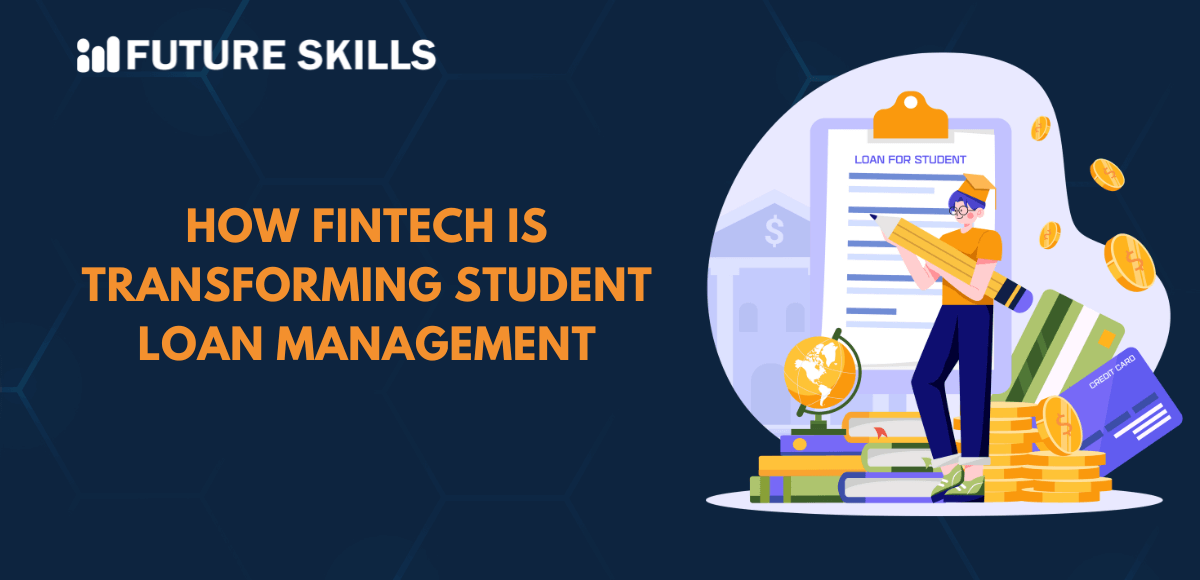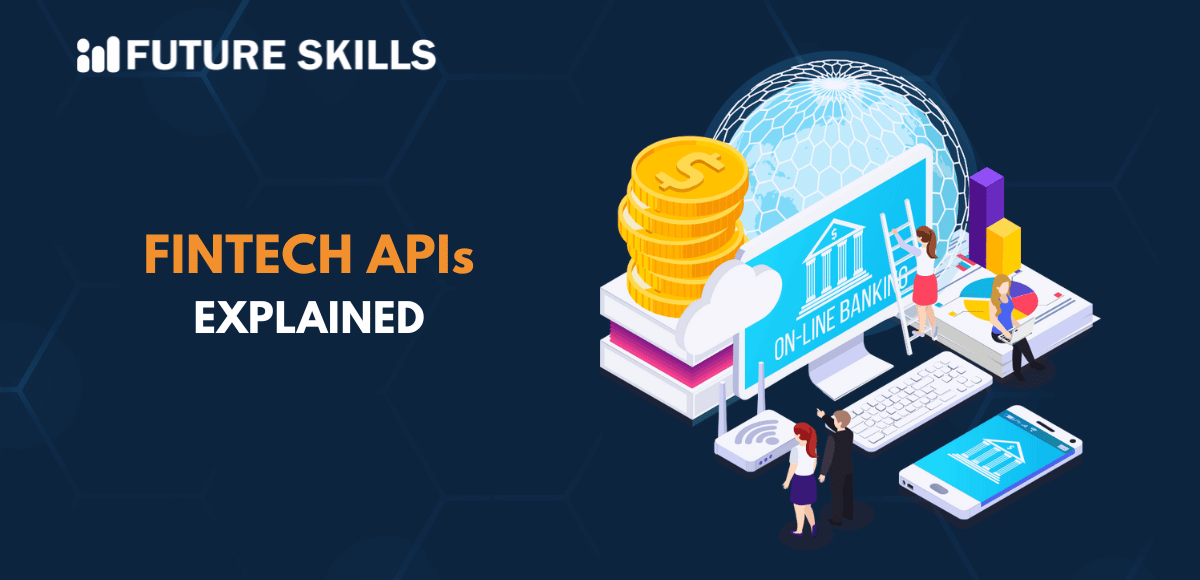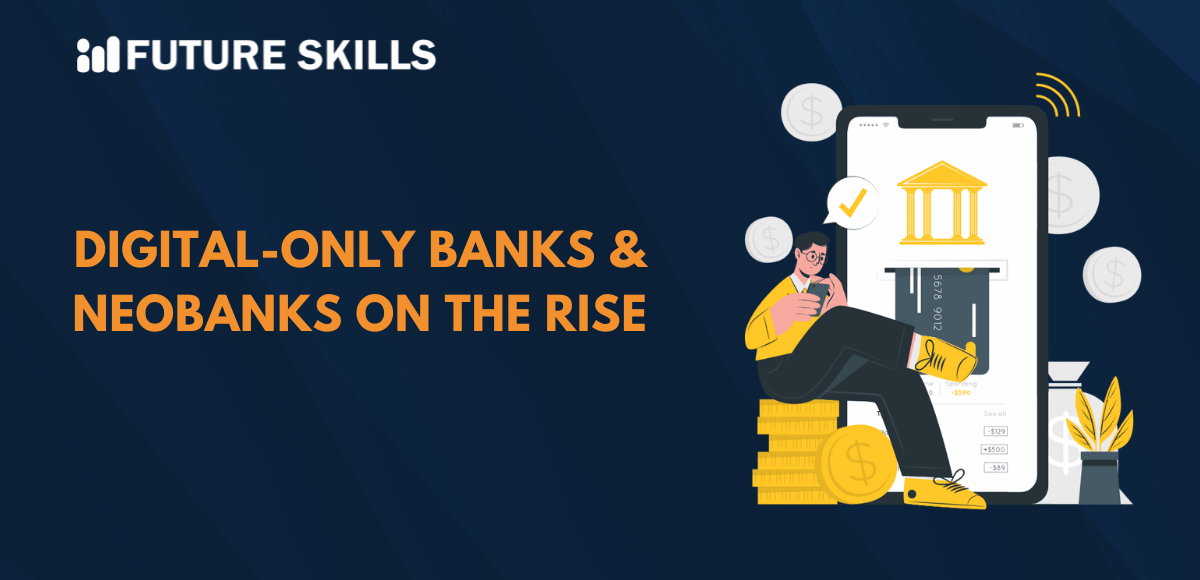Fintech brings an innovative blend of finance and technology to deliver services with better efficiency and more productivity. One of the most notable highlights in the domain of fintech that has attracted everyone’s attention is fintech lending. The use of fintech in education can empower students to finance their education without the challenges found in traditional financial institutions. With the help of diverse technologies, fintech can empower students with flexible ways to avail education loans. Let us learn more about the advantages of fintech for student loan management.
Understand how fintech is revolutionizing the finance sector with our accredited Fintech Certification Course. Enroll today!
Understanding the Process of Fintech Lending
Loan management in the domain of fintech becomes an easier task with the use of digital tools. Borrowers as well as lenders can make the most of enhanced efficiencies in the loan management process. Students are likely to seek loans without any credit history that makes it difficult for them to get loan approvals from traditional financial institutions. On top of it, banks ask for many documents to approve loans, which may create delays in financing education of students.
You can identify the role of fintech in transforming student loan management by understanding how fintech lending works. The process of fintech lending can help you figure out how it is different from traditional. The following steps in fintech lending showcase a clear impression of the benefits of fintech for students.
Fintech lending begins with an online application through digital tools on the fintech platforms. Students don’t have to visit a bank to apply for a loan with fintech lending services.
The lending platform will evaluate different types of data points other than credit scores to determine creditworthiness of an applicant. The important data points considered by fintech platforms include transaction history, educational background, social media activities, and online behavior. Fintech platforms use these data points to check whether the applicant is a worthy borrower.
After completing the credit check, fintech platforms utilize algorithms for processing the available data to make decisions. Fintech platforms make lending decisions within minutes or hours, thereby saving the valuable time of students.
Once the platform approves student loan, it will send the loan amount directly into the applicant’s account. The borrower can enjoy a flexible repayment and loan management experience through the same fintech platform they used to borrow loans. Students can select the option of automatic repayments to avoid any discrepancies in paying back their loans. On top of it, fintech lending platforms also provide tools for loan management and tracking the progress of loan repayment.
Advantages of Fintech for Student Loan Management
Fintech has introduced massive transformation in loan management with benefits for lenders as well as borrowers. With the power of a digital revolution, loans have become more accessible with fintech. Students are one of the largest customer segments of the lending industry with continuous growing demand for education finance. At the same time, students have to go through multiple obstacles to acquire loans for their education. The following benefits of fintech lending can help you understand how fintech has transformed student loan management.
-
Simpler Application Process
The application process in fintech lending is a lot simpler than the one you have to follow in traditional institutions. You can notice education loan transformation in fintech with the freedom from long waits and loads of paperwork. Fintech ensures that students can get faster loan approvals with a simple application process. Students can apply for education loans on fintech platforms through online application forms. The online forms require minimal documentation thereby ensuring that students don’t have to face any challenges in the first step.
Another notable advantage of fintech in the initial stages of education loan application is the assurance of automatic verification. Fintech platforms use AI and advanced algorithms to verify applicant information within seconds, thereby reducing the time required for credit score and background checks. The automatic verification on fintech lending platforms reduces the need to check the credit scores of students. Lending platforms can only check the creditworthiness and eligibility of students to offer loans. Automatic verification also helps in improving accuracy of evaluating loan applicants.
-
New Approach to Credit Scoring
The impact of fintech on student loan management is also evident in the facility of enhanced approaches for credit scoring. You can look for answers to queries like ‘How does fintech change financial management?’ to discover the new approaches for credit scoring introduced by fintech. With the help of fintech, credit scoring has become more fair and accurate. Fintech lending ensures that credit scores don’t hamper anyone’s chances of acquiring education loans.
Fintech platforms rely on multiple data sources including rent payments, utility bills, and previous loans to determine the creditworthiness of borrowers. The holistic assessment of borrowers helps in evaluating the financial behavior of students in different aspects. The alternative data used in credit evaluation encourages financial inclusion and allows students to avail loans on the basis of their financial behavior in real life.
Fintech also guarantees better credit scoring with the help of machine learning algorithms that can evaluate large datasets for accurate predictions on credit risk. Machine learning algorithms can adapt and improve continuously, thereby facilitating relevant and updated credit scores. The dynamic credit scoring approach offers a more clear understanding of creditworthiness of students for education loans. At the same time, lenders can use the accurate and dynamic credit scores to manage risks.
Discover the benefits, challenges, and risks of fintech with this comprehensive Fintech Fundamentals Course and become a fintech expert.
-
New Approaches in Fintech Lending
The fintech landscape has also come up with an innovative solution for lending in the form of peer-to-peer lending platforms. The primary principle of P2P lending platforms revolves around lenders and borrowers exchanging money directly between one another. With the arrival of fintech in education sector, students can capitalize on the diverse benefits of peer-to-peer lending platforms. One of the foremost advantages of such lending platforms in fintech is the assurance of lower costs for borrowing loans. Students can also find a simpler application process with better transparency into all aspects of the loan agreement.
Students can also exercise better control over loan applications without the intervention of intermediaries. Lenders can also gain benefits from P2P lending platforms such as higher returns on investment. The most noticeable advantage for lenders is the assurance of diversifying their loan investment portfolio with better chances for accumulating wealth.
-
Faster Loan Disbursement
Fintech has been responsible for transforming student loan management by expediting the loan disbursement. Students can get funds in their account quickly when required with a faster loan approval and disbursement process. Fintech lending platforms release approved loans directly to the accounts of students within minutes or hours.
Students don’t have to wait for days or weeks to get approval for education loans with fintech platforms. The use of advanced ML algorithms and real-time data analytics empowers lenders to take decisions quickly. As a result, borrowers don’t have to face the uncertainty that comes with longer waiting times.
With fintech platforms, students can make the most of digital transactions to access funds. Fintech lending doesn’t require borrowers to visit the bank to receive money. Digital transactions not only offer convenience but also enhance security as students can receive funds directly in their designated bank account. It is also important to note that digital transactions reduce the administrative burden on lenders and students.
-
Personalized Student Loan Solutions
Fintech has also introduced a wide array of personalized lending products that can help students. One of the notable applications of fintech in transforming student loan management is evident in the facility of data-driven loan recommendations. Fintech lending platforms can leverage data analytics to provide loan options according to a student’s financial situation and requirements. As a result, students can find loans that align with their needs. Students working in part-time jobs can find suggestions for alternative loan options that don’t demand credit scores.
Fintech lending platforms can also recommend loans with lower interest rates to students. It is also important to remember that fintech platforms offer flexible options for repaying student loans. Students can pick any type of repayment schedule according to their financial situation and other challenges. The element of personalized repayment options in fintech lending is useful in a time when student loan debt is on the rise. For example, students can opt for income-based repayment schedules that can help in adjusting monthly payments according to student income. Flexibility in loan repayment ensures that students can manage their loans effectively even in economic uncertainty.
Learn some important Fintech interview tips and how to prepare for the interview if you want to build a career in Fintech.
Final Thoughts
The impact of fintech in education extends beyond the facility of a new approach to lending. Students can capitalize on fintech to experience a completely new perspective on acquiring and repaying loans. Fintech has simplified student loan management by removing many overheads and introducing new efficiencies. Fintech lending platforms don’t rely on credit scores alone as the preferred method to measure creditworthiness of students.
The advantages of fintech lending for students also draw attention towards personalization of loan products. Personalized loan products can help students choose the repayment schedules and strategies according to their financial needs. As the domain of fintech continues growing, student loans are likely to become more accessible and affordable in future. Learn more about fintech and its use cases in different industries now.







